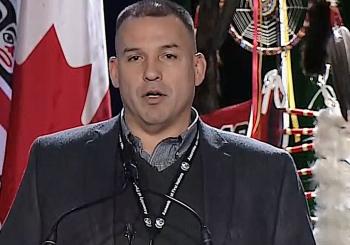Image Caption
Summary
Windspeaker.com Contributor
When the Assembly of First Nations hosted a joint priorities meeting in January with high ranking government officials, including Prime Minister Justin Trudeau, there were two important people missing from around the table: Public Safety and Emergency Preparedness Minister Ralph Goodale and a representative from the First Nations Chiefs of Police Association.
Both were glaring absences considering the agenda. The meeting was to discuss the AFN-Canada Memorandum of Understanding. Top of the joint priorities list was “policing and community safety issues affecting First Nations.”
“I’m disappointed (Goodale) wasn’t there. He’s the big guy who makes the decisions in this area,” said Dwayne Zacharie, president of the First Nations Chiefs of Police Association. “I’m also disappointed that First Nations policing wasn’t there and that it was the AFN and not, say, the First Nation Police Chiefs Association, who are the experts in First Nations policing.”
There would have been value, he said, to have had the First Nation Police Chiefs Association provide information and background on the issue to the federal government.
Zacharie attributes the lack of an invitation to attend the meeting as the AFN not being aware of the association. However, that seems unlikely. Zacharie, himself, presented at the Special Chiefs Assembly in December 2018. He spoke to the need to have First Nations policing become a legislated essential service. The association has been in existence since 1993. The First Nations Policing Program (FNPP) came into effect in 1991.
As it stands now, he said, the First Nations Policing Program is a long-term federal program with no guarantee it will continue from one year to the next. That lack of guarantee means that many First Nations people are not considering policing as a career. Although First Nations officers get the same training as their mainstream counterparts, whether through the RCMP or the provincial police, they make less money than those who keep the peace off-reserve.
In those almost 30 years, there has been little change in the structure of the program, so the new demands of policing on reserves are not being met.
“The resources in the program have been lacking for a long, long time,” said Zacharie.
“The way the program is designed; it’s set up to fail. There’s no safe guards put in place, the dollars aren’t always there. First Nations police departments are funded less than … mainstream policing.”
Zacharie points to the 2014 Auditor General’s report which included recommendations for changes to policing on reserve.
“Overall, we concluded that Public Safety Canada’s First Nations Policing Program is not adequately designed to deliver and does not adequately ensure that policing services on First Nations reserves are delivered in a manner that is consistent with the principles of the First Nations Policing Policy that we examined,” said the report.
As far as Zacharie knows, none of those recommendations have been implemented.
In fact, said Zacharie, the number of First Nations police officers is decreasing at a time when First Nations populations are increasing, and the number of stand-alone First Nations police departments has dropped from 60 to 36.
In 2018, Goodale announced an additional $291.2 million for the First Nations Policing Program for hiring new recruits, increased salaries, and additional training and equipment. The money was not intended for the expansion of the program. The funding also included a 2.75 per cent escalator to address inflation.
These are only small increases, said Zacharie, for a program that is important for First Nations.
“First Nations police departments are generally manned… by First Nations police officers, and First Nations police officers are more in tune with the needs of the community because,
- they understand First Nations people, and
- generally, they’re from the community that they’re policing in so they have an intimate knowledge of the community and they’re better able to fit in. And
- there isn’t a lot of turn-over by First Nations police officers…. Generally, they work there for a long time. The community gets to know them,” he said.
Other organizations that police on reserves, he adds, see officers cycle in and leave after two or three years.
“First Nations police services are there all the time, 24 hours a day, seven days a week. Whereas I’ve heard a lot of complaints from First Nations communities who have other services doing the policing. It’s hit or miss,” he said.
With the country-wide opioid crisis hitting reserves particularly hard, he says it’s important that First Nations have first responders available immediately.
Zacharie would like to see more communication between the AFN and the First Nations Chiefs of Police Association. While he says the AFN has never reached out to his association asking for its input, he’s hoping that has changed.
“We’ve actually recently started to have discussions on that and I think that the AFN understands where we’re coming from now. I spoke to the national chief and I think going forward we’re going to have a much different relationship and there’s going to be a good partnership there,” he said.
Zacharie stressed it is important for the First Nations Chiefs of Police Association be involved in the discussion so the government can understand why it’s necessary that First Nations policing move from a program to an essential service.
His comments echo the Auditor General, who stated in 2014, “In our view, Public Safety Canada needs to work with the provinces, First Nations communities, and policing service providers to guide the future direction of the Program.”
Quebec and Labrador Regional Chief Ghislain Picard, who holds the policing portfolio for the AFN, did not respond to requests for an interview from Windspeaker.com. However, speaking at the Special Chiefs Assembly in December, Picard said that Goodale was open to discussions about transforming the national program into a “legislative essential service.”
At the joint priorities meeting in January, Karen McCrimmon, parliamentary secretary to the minister of Public Safety and Emergency Preparedness, represented the federal government in discussions on First Nations policing.

